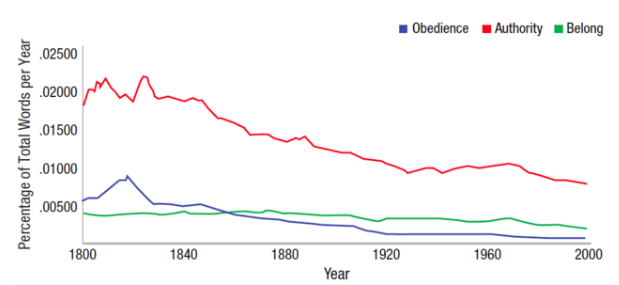The Linguistic Tapestry: How Words Shape and Reshape Culture
No other species communicate with the verbal and literate verbosity of homo species. We have written an estimated 130 million books; the average person will speak 860 million words and communicate with over 80,000 people in their lifetime.
And those words we speak, over time, reflect something about ourselves individually (what is called the personal conscience) and our society (the group conscience).
Let me give you an example. Google has a fascinating tool called Ngram, which allows people to see how the use of words in books has changed over time. Patricia Greenfield, a Cultural Psychologist, used this to show how America was becoming more individualistic in its thinking. The use of words like ‘self’, ‘Individuals’, and ‘unique’ is increasing at the expense of collective and community-associated words like ‘obedience’, ‘authority’, and ‘belonging’.
The Universities of Texas and Michigan have demonstrated how after catastrophic events like 9/11 - words associated with the community, togetherness and more social language are increasingly used.
Language is a rich and complex tapestry, but let’s take a single thread: that language reflects something about our culture, concerns, and inner beliefs. It’s not surprising, for example, that words like ‘sustainable', ‘green’ and ‘climate’ have increased in their usage in the past thirty years.
But it’s not a one-way street. Just as what we think reflects how we feel, how we choose to feel can change how we think. And so, language can be a tool for intentionally evolving our culture. I would argue that it's the only way to change a culture effectively.
The Enlightenment was a period of European History where the worldview shifted from a church-driven narrative to a more rational, sceptical and academic-driven viewpoint. We went from not knowing to knowing. In the forty years before the Enlightenment came to light as a movement (1685) with the likes of Locke, Descartes and Voltaire, words like ‘think’ and ‘self’ saw a sharp rise in their usage. In other words, the Enlightenment did not burst onto the scene as a new idea; it resulted from forty years of a gradual linguistic shift in society. A slow turning away from ‘sin’, ‘obedience’, ‘we’, ‘hierarchy’, ‘mystery’ and ‘spiritual.’ And a turning towards a world of ‘science’, ‘proof’, ‘academia’, ‘the self’, ‘ego’, and ‘knowledge’.
So, language reflects the culture and is how we influence and change a culture over time.
What does this mean for the microcosm of our organisations? Or, to put it another way, what do your words say about your culture?
For example, do we use words of inclusion: ‘yes’, ‘we’, ‘good idea’, ‘and…’? Do we use words of curiosity: ‘I don’t know’, ‘what if…’, ‘explore’, ‘question', and ‘when’? Or do we use exclusive words: ‘I', ‘you’, and ‘no but’?
Some words open up space, words born of curiosity and interest: ‘yes,’ 'I don’t know’. Some words close down space; they are words born of fear: ‘no’, ‘I know’.
Cultural change is almost impossible; when it does happen, it takes time. For the Enlightenment to become a force of change took forty years. For the Israelites to unlearn the behaviour of slavery in Egypt took forty years. For the last thirty-five years, we’ve used words like ‘green’, ‘sustainable’, and ‘climate change’. Have we seen a significant change in culture or behaviour? No. Essentially, little has changed. But we’re now just starting to see things happen. Perhaps forty is the magic number?
Let me give you two examples. We have a client we work with. She is a CHRO for a large multinational. They’re a fantastic organisation—genuine, down-to-earth, passionate people. However, the word ‘people’ did not appear in the organisation. For the incoming head of HR, this was something of a surprise. It was not in monthly reports; it was not in any metrics; it was not in any policy documents. The only reference was the accounts where people were down as a ‘cost’.
So she did something straightforward: introducing a new word to the Board Meetings and all reports: ‘people.’ How are our people doing? What are our people happy about? What are you people concerned about? Within six months, the word people started to appear throughout the organisation and across different countries and business units. People are talking about being people and the importance of people.
Secondly, we worked with another client a couple of years ago. Every meeting we attended used exclusivity: words about creating a difference between ‘them’ and ‘us’; and between ‘her' and ‘me'. That language was reflected in the organisation's behaviour, from how security spoke to people entering the building to meetings with the Board. Now, maybe that was what was necessary for this organisation to survive. It is not for us to judge. Merely observe.
However, if you want to start changing your organisation's culture, here is where you might begin.
Start removing the words that close down space, create exclusion, and reinforce differences.
Start using words that celebrate creativity, diversity, difference, relationship, community and care.
Add to those words that make a more sustainable workplace and planet - that is compulsory.
Create a common language with clear definitions. Step one in creating clarity: do we all mean the same thing when we talk about ‘sustainability’ - or whatever the word is? Define it, make it, share it.
At the same time, as words like ‘think’ and ‘self’ were used forty years before the Enlightenment kicked in, words like ‘sin’ saw a massive resurgence. So expect there to be a battle. No one likes change, and there will be pushback. So, what words in your organisation might hint at a change that needs to happen but does not want to happen?
It takes time, so be patient and be intentional.
Your language reflects who you are and how you begin to change yourself. As we walk into 2023, it's easy to be overcome by a
sense of powerlessness and hopelessness as forces apparently outside our control drive higher fuel prices, slow down the economy, and perpetuate war, oppression and food shortages. But let’s choose our words carefully. Not to ignore what is happening around us but to choose an intentional path through what is happening around us. Like the nine-year-old girl who stepped out on Christmas Day morning with her new insulated waders and decided today would be the day she would finally find a Megalodon tooth. And did. With the right words, we can manifest something new: for ourselves, for our teams, for our organisation, and for our communities.
So, let’s use words that build community, break down barriers and seek to de-escalate rather than escalate.
Words that create space for not knowing, curiosity, vulnerability and openness.
And words that seek to mend, forgive and rebuild.
It may take time, but now is an excellent time to start.
i https://mashable.com/archive/number-of-books-in-the-world#NzQGI1gsamqR
ii https://www.amazon.com/Joy-Lex-How-Have-Words/dp/068801397X
iii https://blog.adioma.com/counting-the-people-you-impact-infographic/
iv https://books.google.com/ngrams/
v https://journals.sagepub.com/doi/pdf/10.1177/0956797613479387?casa_token=LNcsFKlu4hUAAAAA:4_SBJusx1ZjAK13Kj1DMi9CXKlhP0490w8W0ZnmIPJPj-ffBXe5ao19WUUbrafq09IKJ8kKf6XVa5w
vi https://journals.sagepub.com/doi/pdf/10.1111/j.0956-7976.2004.00741.x?casa_token=vN2teef25K4AAAAA:Ckuhhtzyjt_4VCAW3cwSKspJY5cSdyBt-gBjnXoFYNgwzLmGdUUPdWinYJfwjkDhYXKbX0uODKhlVw
vii https://www.mygriefassist.com.au/factsheets/factsheet-10-how-our-thoughts-govern-how-we-feel/
viii https://www.bbc.co.uk/news/world-us-canada-64231245



